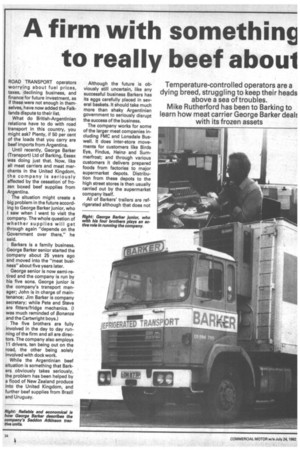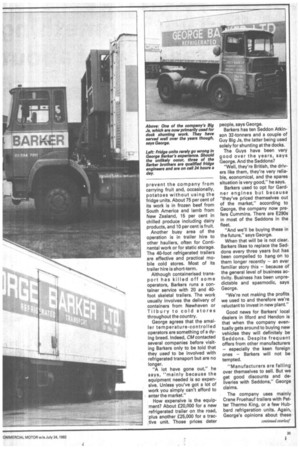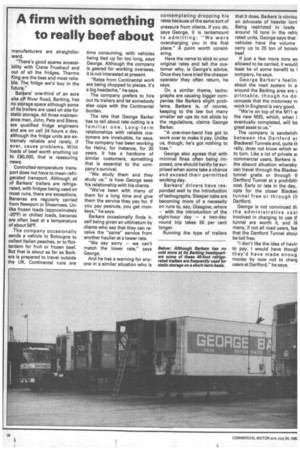A firm with something to really beef abou1
Page 32

Page 33

Page 34

If you've noticed an error in this article please click here to report it so we can fix it.
ROAD TRANSPORT operators worrying about fuel prices, taxes, declining business, and finance for future investment, as if these were not enough in themselves, have now added the Falklands dispute to their list.
What do British-Argentinian relations have to do with road transport in this country, you might ask? Plenty, if 50 per cent of the loads that you carry are beef imports from Argentina.
Until recently, George Barker (Transport) Ltd of Barking, Essex was doing just that. Now, like all meat carriers and meat merchants in the United Kingdom, the company is seriously affected by the cessationof frozen boxed beef supplies from Argentina.
The situation might create a big problem in the future according to George Barker junior, who I saw when I went to visit the company. The whole question of whether supplies will get through again "depends on the Government over there," he said.
Barkers is a family business. George Barker senior started the company about 25 years ago and moved into the "meat business" about five years later.
George senior is now semi-retired and the company is run by his five sons. George junior is the company's transport manager; John is in charge of maintenance; Jim Barker is company secretary; while Pete and Steve are fitters/fridge mechanics. (I was much reminded of Bonanza and the Cartwright boys.) The five brothers are fully involved in the day to day running of the firm and all are directors. The company also employs 11 drivers, ten being out on the road, the other being solely involved with dock work.
While the Argentinian beef situation is something that Barkers obviously takes seriously, the problem has been helped by a flood of New Zealand produce into the United Kingdom, and further beef supplies from Brazil and Uruguay. Although the future is obviously still uncertain, like any successful business Barkers has its eggs carefully placed in several baskets. It should take much more than shaky Argentinian government to seriously disrupt the success of the business.
The company works for some of the larger meat companies including FMC and Lonsdale Buswell. It does inter-store movements for customers like Birds Eye, Findus, Heinz and Summerfrost; and through various customers it delivers prepared foods from factories to major supermarket depots. Distribution from these depots to the high street stores is then usually carried out by the supermarket company itself.
All of Barkers' trailers are refrigerated although that does not prevent the company from carrying fruit and, occasionally, potatoes without using the fridge units. About 75 per cent of its work is in frozen beef from South America and lamb from New Zealand, 15 per cent in chilled produce including dairy products, and 10 per cent is fruit.
Another busy area of the operation is in trailer hire to other hauliers, often for Continental work or for static storage. The 40-foot refrigerated trailers are effective and practical mobile cold stores. Most of its trailer hire is short-term.
Although containerised transport has killed off some operators, Barkers runs a container service with 20 and 40foot skeletal trailers. The work usually involves the delivery of containers from Newhaven or Tilbury to cold stores throughout the country.
George agrees that the smaller temperature-controlled operators are something of a dying breed. Indeed, CM contacted several companies before visiting Barkers only to be told that they used to be involved with refrigerated transport but are no longer.
"A lot have gone out," he says, "mainly because the equipment needed is so expensive. Unless you've got a lot of work you simply can't afford to enter the market."
How expensive is the equipment? About £20,000 for a new refrigerated trailer on the road, plus another £25,000 for a trac_five unit. Those prices deter people, says George.
Barkers has ten Seddon Atkinson 32-tonners and a couple of Guy Big Js, the latter being used solely for shunting at the docks.
The Guys have been very good over the years, says George. And the Seddons?
"Well, they're British, the drivers like them, they're very reliable, economical, and the spares situation is very good," he says.
Barkers used to opt for Gardner engines but because "they've priced themselves out of the market," according to George, the company now prefers Cummins. There are E290s in most of the Seddons in the fleet.
"And we'll be buying these in the future," says George.
When that will be is not clear. Barkers likes to replace the Seddons every three years but has been compelled to hang on to them longer recently — an ever familiar story this — because of the general level of business activity. Business has been unpredictable and spasmodic, says George.
"We're not making the profits we used to and therefore we're reluctant to invest in new plant."
Good news for Barkers' local dealers in Ilford and Hendon is that when the company eventually gets around to buying new vehicles they will definitely be Seddons. Despite frequent offers from other manufacturers — especially the keen foreign ones — Barkers will not be tempted.
"Manufacturers are falling over themselves to sell. But we get good discounts and deliveries with Seddons," George claims.
The company uses mainly Crane Fruehauf trailers with Petter Thermo King, or a few Hubbard refrigeration units. Again, George's opinions about these manufacturers are straightforward.
"There's good spares accessibility with Crane Fruehauf and out of all the fridges, Thermo King are the best and most reliable. The fridge we'd buy in the future."
Barkers' one-third of an acre site off River Road, Barking, has no storage space although some of its trailers are used on site for static storage. All three maintenance men, John, Pete and Steve, are qualified fridge engineers and are on call 24 hours a day, although the fridge units are extremely reliable and rarely, if ever, cause problems. With loads of beef worth anything up to £90,000, that is reassuring news.
Controlled-temperature transport does not have to mean refrigerated transport. Although all of Barkers' trailers are refrigerated, with fridges being used on most runs, there are exceptions. Bananas are regularly carried from Newport or Sheerness. Unlike frozen loads (approximately -20°F) or chilled loads, bananas are often best at a temperature of about 56°F.
The company occasionally sends a vehicle to Bolougne to collect Italian peaches, or to Rotterdam for fruit or frozen beef. But that is about as far as Barkers is prepared to travel outside the UK. Continental runs are time consuming, with vehicles being tied up for too long, says George. Although the company is geared for working overseas, it is not interested at present.
"Rates from Continental work are being chopped to pieces. It's a big headache," he says.
The company prefers to hire out its trailers and let somebody else cope with the Continental burden.
The tale that George Barker has to tell about rate cutting is a familiar one. Long-term relationships with reliable customers are invaluable, he says. The company has been working for Heinz, for instance, for 20 years. It has a hardcore of similar customers, something that is essential to the company's survival.
"We study them and they study us," is how George sees his relationship with his clients.
"We've been with many of them for a long time and give them the service they pay for. If you pay peanuts, you get monkeys," he says.
Barkers occasionally finds itself being given an ultimatum by clients who say that they can receive the "same" service from another haulier at a lower rate.
"We say sorry — we can't match the lower rate," says George.
And he has a warning for anyone in a similar situation who is contemplating dropping his rates because of the same sort of pressure from clients. If you do, says George, it is tantamount to admitting: "We were overcharging you in the first place." A point worth considering.
Have the nerve to stick to your original rates and tell the customer why, is George's advice. Once they have tried the cheaper operator they often return, he says.
On a similar theme, tachographs are causing bigger companies like Barkers slight problems. Barkers is, of course, keeping to the law but many smaller set ups do not abide by the regulations, claims George Barker.
"A one-man-band has got to work over to make it pay. Unlike us, though, he's got nothing to lose."
George also agrees that with minimal fines often being imposed, one should hardly be surprised when some take a chance and exceed their permitted working day.
Barkers' drivers have responded well to the introduction of tachographs. Sleeper cabs are becoming more of a necessity on runs to, say, Glasgow, where — with the introduction of the eight-hour day — a two-day round trip takes 50 per cent longer.
Running the type of trailers that it does, Barkers is obviou an advocate of heavier lorri Being restricted to loads around 16 tons in the refri rated units, George says that I vehicles have the volume carry up to 25 ton of bond( beef.
If just a few more tons wt allowed to be carried, it would least be of some benefit to I company, he says.
George Barker's feelin, about the road system in a around the Barking area are u printable, though he do, concede that the motorway nt work in England is very good.
"We're on top of the M11 al the new M25, which, when i eventually completed, will be great asset to us."
The company is sandwichi between the Dartford ar Blackwall Tunnels and, quite lit rally, does not know which +m to turn. Like a lot of private at commercial users, Barkers is the absurd situation whereby can travel through the Blackm tunnel gratis or through ti Dartford Tunnel at a prohibith cost. Early or late in the day, opts for the closer Blackm tunnel free or through th Dartford.
George is not convinced th. the administrative cos1 involved in charging to use th tunnel are worth it, and lik many, if not all road users, fee that the Dartford Tunnel shoul be toll free.
"I don't like the idea of havin to pay. I would have thougl they'd have made enoug money by now not to charg users at Dartford," he says.










































